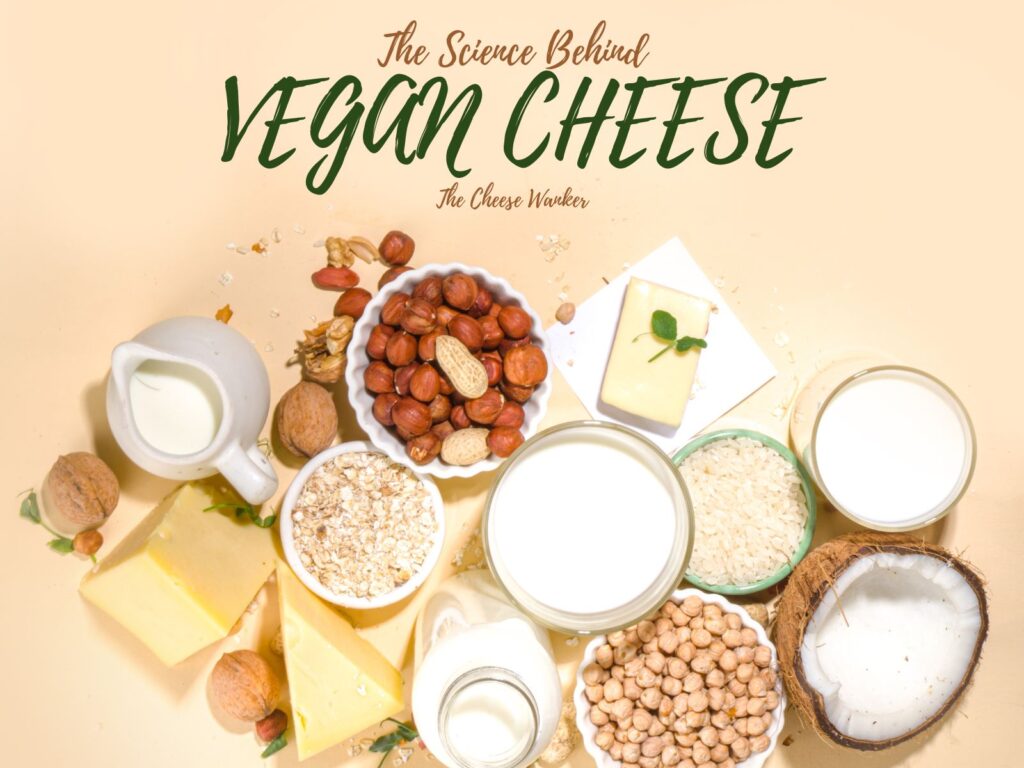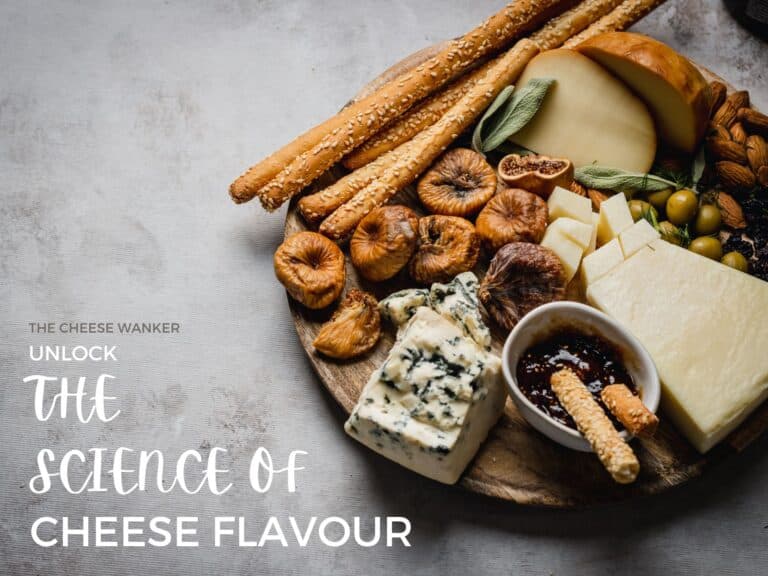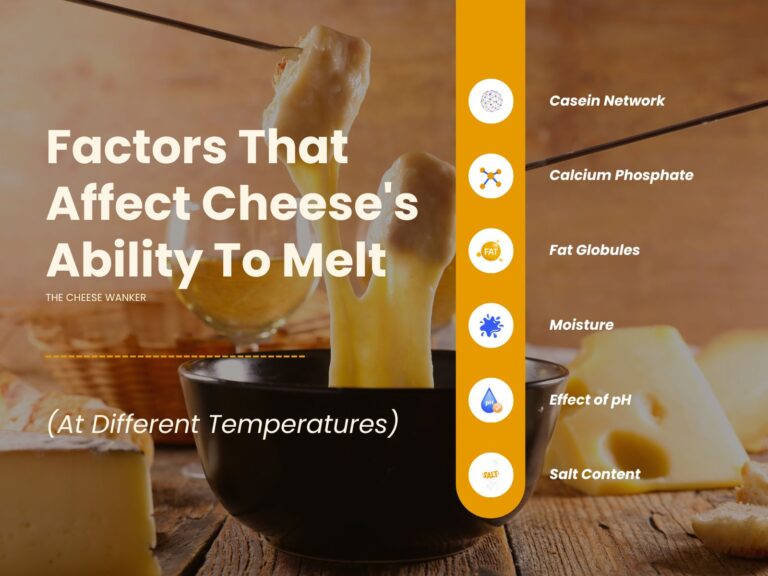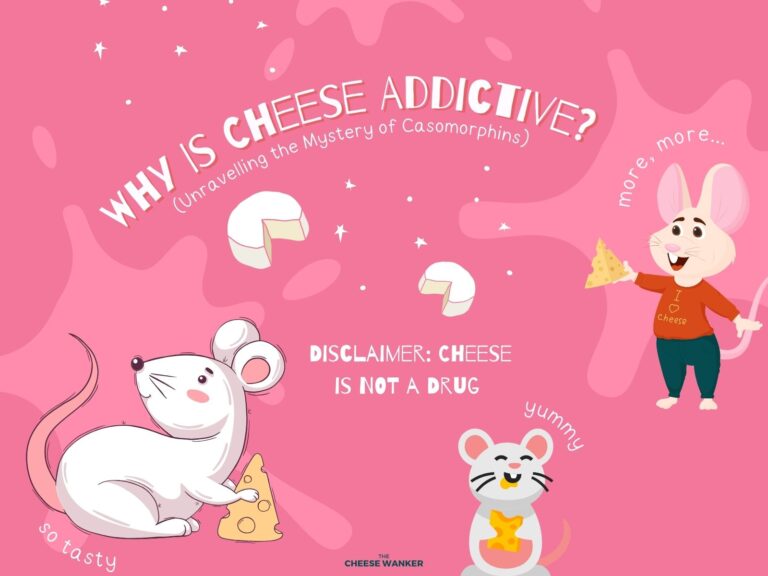In the world of modern cuisine, veganism is no longer just a trend; it’s a lifestyle choice embraced by millions. One of the most exciting developments in the culinary world is the evolution of vegan cheese. But how do plant-based ingredients transform into something resembling the creamy, savoury goodness of traditional dairy cheese? Let’s take a deep dive into the science of vegan cheese.

Disclaimer
The purpose of this article is to objectively explore the science of plant-based cheese alternatives. We withhold judgement on how these products compare to dairy cheese. And whether they should be referred to as cheese.
Difference between vegan cheese and vegetarian cheese
Before we launch into our exploration of vegan cheesemaking, let’s make a clear distinction between vegan cheese and its vegetarian counterpart. While both options veer away from traditional cheese, the divergence in their compositions and production methods is substantial.
Vegan cheese
Crafted exclusively from plant-based ingredients, vegan cheese use plant-based milk substitutes like almond and soy. Additionally, plant-based fats add the creamy texture and fermentation processes enhance its flavours, all without any animal involvement.
Vegetarian cheese
While free from animal rennet, vegetarian cheese can still contain dairy components. Produced from animal milk, it caters to lacto-vegetarians. While the absence of animal enzymes sets it apart, it retains the essence of traditional cheesemaking methods.
History of vegan cheesemaking
While contemporary vegan cheese might seem like a recent phenomenon, its roots extend far back in time.
Early experiments
The concept of vegan cheese can be traced to ancient civilisations where inventive cooks explored plant-based alternatives. For instance, early Buddhist monks in China and Japan crafted tofu-based products that mirrored the textures of dairy.
These endeavours marked the rudimentary beginnings of a journey toward the development of vegan cheese.
The Industrial Revolution and nutritional science
The Industrial Revolution brought about significant changes in food production. With the rise of vegetarianism in the 19th century, inventive minds sought alternatives to animal products.
In this era, plant-based cheeses, often utilising nuts and seeds, began to appear in health food stores and cookbooks. Simultaneously, advancements in nutritional science provided insights into the value of plant-based diets, sparking further interest in vegan cheese alternatives.
Mid-20th century innovations
The mid-20th century witnessed a surge in veganism and vegetarianism, driven by ethical, health and environmental concerns.
As a result, the demand for non-dairy cheese alternatives grew. Enterprising individuals and small-scale producers began experimenting with soy, creating soy-based cheeses that, while rudimentary, laid the groundwork for future innovations.
The advent of modern vegan cheesemaking
The late 20th and early 21st centuries heralded a new era for vegan cheesemaking. Chefs and food scientists, armed with a deep understanding of food science and abundant plant-based ingredients, embarked on a quest to create vegan cheeses. Their goal: to mimic dairy’s texture and replicate its intricate flavours using innovative culinary techniques.
Technological advancements and culinary creativity
The 21st century witnessed a remarkable convergence of technology and culinary creativity. Food scientists began to utilise fermentation processes, similar to those in traditional cheesemaking, to craft vegan cheeses with nuanced flavours.
Additionally, the rise of social media and the internet enabled the sharing of recipes and techniques. This fostered a global community of vegan cheesemakers, encouraging idea exchange and pushing the boundaries of what was achievable in the realm of vegan cheese.
Ingredients used in vegan cheesemaking
Vegan cheesemaking is an intricate art that relies on a selection of key ingredients, each contributing to the textures and flavours. Here’s a closer look at the most used components in this creative culinary process.
1. Nuts and seeds
Nuts like cashews and almonds, along with seeds such as sunflower and hemp, are foundational ingredients. They provide the base texture for vegan cheeses, blending into a creamy consistency when processed, ensuring a satisfying mouthfeel.
2. Soy
Soybeans, in various forms like tofu or soy milk, are incredibly versatile. They offer proteins that mimic the stretchiness of dairy cheese when melted, making them a common choice for vegan cheese production.
3. Nutritional yeast
Next, nutritional yeast is a powerhouse ingredient. It lends a cheesy flavour profile to vegan cheeses and is packed with essential vitamins, especially B12. Its umami-rich taste adds depth and complexity to the final product.
4. Plant-based fats
Coconut oil, which is solid at room temperature, is often used to replicate the meltability of dairy cheese. It provides the satisfying melt-in-the-mouth experience that cheese enthusiasts adore.
5. Agar agar
Derived from seaweed, agar agar acts as a natural gelling agent, replacing gelatin in vegan recipes. It’s instrumental in creating the firmness and structure of certain vegan cheese varieties.
6. Cultures and enzymes
Probiotics, similar to those used in yogurt, and plant-derived enzymes like those found in papaya (papain) or pineapples (bromelain) aid in fermentation. They break down ingredients, enhancing flavours and developing the characteristic tang found in aged cheeses.
7. Tapioca starch
Tapioca starch, derived from cassava root, is a common thickening agent. It contributes to the stretchiness of vegan cheese, making it suitable for applications like pizza or grilled cheese sandwiches.
8. Xanthan gum and carrageenan
Xanthan gum, a natural thickener, and carrageenan, derived from seaweed, further enhance the texture and stability of vegan cheese. They provide the necessary cohesiveness, ensuring a smooth, consistent product.
9. Calcium phosphate
Finally, calcium phosphate is often used in vegan cheesemaking as a calcium fortifier. It serves as a vegan-friendly source of calcium, especially in plant-based diets where dairy products are excluded.
By incorporating calcium phosphate, vegan cheese producers can enhance the nutritional value of their products, making them a viable alternative for individuals seeking calcium-rich, plant-based options.
Vegan cheesemakers use these ingredients synergistically, creating a diverse range of flavours and textures. While this diversity does not rival traditional dairy cheese, it does make plant-based options more enticing.
The growing popularity of vegan cheese has introduced us to a diverse array of options on the market. While this variety caters to different tastes and preferences, it’s natural to wonder about the extensive list of ingredients found in some vegan cheese products.
As discerning consumers, it’s essential to be aware and mindful of what goes into the foods we consume.
Understanding ingredient labels
When exploring vegan cheese options, take a moment to examine the ingredient labels. While a long list isn’t inherently bad, it’s crucial to recognise the components.
Look for recognisable, whole-food ingredients like nuts, seeds and natural flavourings. Be cautious of highly processed additives, excessive preservatives, or artificial colourings, which might compromise the healthfulness of the product.
Simplicity as a virtue
In the realm of plant-based eating, simplicity often reigns supreme. Just as a meal made with fresh, whole ingredients is preferable, the same principle applies to vegan cheese.
Opting for varieties with fewer, natural components ensures a closer connection to the source and minimises potential health concerns associated with highly processed foods.
Homemade vegan cheese: A healthier alternative
For those concerned about the complexity of store-bought vegan cheeses, consider exploring the world of homemade options. Creating your vegan cheese at home grants you full control over the ingredients.
You can select fresh, wholesome components, avoiding excessive additives and preservatives. This hands-on approach not only ensures a healthier product but also provides a satisfying culinary experience.
Moderation and mindful consumption
Regardless of whether you choose store-bought or homemade vegan cheese, moderation is key. While vegan cheeses can be a delightful part of a plant-based diet, they should be enjoyed in balance with other nutrient-dense foods.
Being mindful of portion sizes and incorporating a variety of whole foods into your diet ensures a well-rounded, health-conscious approach to plant-based living.
Enhancing the flavour of vegan cheeses
One of the fascinating aspects of vegan cheesemaking lies in the intricate process of flavour enhancement.
While traditional dairy cheeses develop their characteristic tastes through ageing and fermentation, vegan cheesemakers employ innovative techniques to achieve complex and nuanced flavours in their creations.
Fermentation magic
Fermentation plays a pivotal role in elevating the taste profile of vegan cheeses. Probiotics and cultures, akin to those used in dairy fermentation, are introduced.
These friendly bacteria break down ingredients, creating subtle tanginess and enhancing depth, mirroring the complexity found in aged dairy cheeses.
Umami-boosting ingredients
Vegan cheesemakers often turn to umami-rich components to intensify flavours. Nutritional yeast, mushrooms, soy sauce and miso paste are among the umami-boosting ingredients used.
Their savoury notes add layers of richness, providing a satisfying and cheese-like experience.
The influence of ageing
While vegan cheeses don’t undergo the same ageing process as dairy cheeses, they are aged to some extent to develop flavours.
During this period, the flavours mature and intensify, creating a robust taste profile. Ageing also allows the cheese to achieve a firmer texture, enhancing both the taste and mouthfeel.
Creative additions
Finally, vegan cheesemakers often incorporate creative additions to enhance flavours. Herbs, spices, garlic and smoked elements are introduced, offering diverse taste experiences.
These additions not only elevate the cheese’s taste but also provide versatility, allowing a wide range of tastes to cater to various culinary preferences.
Mimicking the melt and cheese-pull: The ingenious secrets of vegan “Mozzarella”
Mozzarella, with its characteristic stretchiness and gooey melt, has long been a favourite cheese for many. Replicating these properties in vegan cheese involves a meticulous balance of ingredients and techniques, showcasing the creativity and innovation of vegan cheesemakers.
Since Mozzarella is a treasured Italian tradition made with either buffalo or cow’s milk, we’re going to use a different name when referring to the plant-based version. Let’s call it PlantMoz!
The base ingredients
At the heart of PlantMoz lies a combination of cashews or almonds and soy milk. Cashews provide a creamy texture when blended, while soy milk offers proteins that mimic the stretchiness of dairy cheese when heated.
This combination forms the base, providing the foundational texture necessary for the perfect cheese-pull.
Agar agar and/or tapioca starch
Agar agar, derived from seaweed, and tapioca starch are the secret weapons in achieving the right consistency. Firstly, agar agar acts as a natural gelling agent, creating a firm structure essential for the cheese-pull.
On the other hand, tapioca starch adds the necessary stretchiness, making the cheese pliable and malleable.
Emulsifiers and stabilisers
Emulsifiers like soy lecithin and stabilisers such as xanthan gum play crucial roles in PlantMoz. They create a stable emulsion, allowing the fats to bind seamlessly with water.
This emulsion is what gives PlantMoz its smooth, melt-in-the-mouth quality and ensures it doesn’t separate or become grainy upon heating.
Plant-based fats
Coconut oil is often used to mimic the melting qualities of dairy cheese. When heated, it liquefies, providing the satisfying ooze and creaminess that are hallmarks of a perfect melt.
The right balance of fats ensures that the cheese doesn’t become overly greasy but maintains a rich, indulgent texture.
In the hands of skilled vegan cheesemakers, the combination of these ingredients and techniques results in PlantMoz that adequately mimics the melt and cheese-pull texture of its dairy counterpart.
Can you grow a white mould rind on soft vegan cheeses?
Yes, it is possible to grow white mould on soft vegan cheeses, similar to how it occurs in some traditional dairy cheeses. White mould, often associated with cheeses like Brie and Camembert, adds a unique flavour and texture profile to the cheese.
In vegan cheesemaking, the process involves using specific strains of mould cultures to create the characteristic white rind. One example is the vegan Geotrichum candidum sold by Start Cultures Eu. Since this particular strain has been grown on a non-dairy medium, it is suitable for vegans.
To grow white mould on soft vegan cheeses, certain conditions need to be controlled, such as humidity, temperature and air circulation. Vegan cheesemakers use carefully controlled environments like special ageing containers to facilitate the growth of mould.
They usually introduce the moulds during the cheesemaking process and allow them to develop under controlled conditions.
It’s worth noting that while the process of growing white mould on vegan cheeses is possible, it requires expertise and precision, as the balance of humidity and temperature is crucial. And you should not expect your cheese to look exactly like a Brie or Camembert.
Is vegan cheese healthy?
The healthiness of vegan cheese, like any food product, depends on its ingredients, nutritional content, and how it fits into an overall balanced diet. Here are some points to consider when evaluating the healthiness of vegan cheese:
Overall nutritional content
Vegan cheeses vary widely in nutritional content. Some are made from whole foods like nuts, seeds, and nutritional yeast, providing essential nutrients such as healthy fats, protein, vitamins, and minerals.
Others might be highly processed, containing added sugars, salts and preservatives. It’s essential to read the nutrition labels to understand what you’re consuming.
Lower in saturated fat (sometimes)
Vegan cheeses are generally lower in saturated fat, which is beneficial for heart health. Traditional dairy cheese can be high in saturated fat, which, when consumed in excess, may contribute to heart issues.
Depending on the brand and type of cheese, saturated fat content can vary significantly. Be sure to always read the label before purchasing.
Naturally lactose-free
Of course, vegan cheese is naturally lactose-free. This makes it a suitable alternative for individuals who are lactose intolerant or have dairy allergies.
High caloric content
Vegan cheese can be calorically dense, especially if it’s made from nuts or oils. Portion control is important, especially for those watching their calorie intake.
Lower protein content
Some vegan cheeses contain protein from ingredients like nuts, tofu, or legumes, making them a protein source for individuals following a plant-based diet.
However, the protein content can vary significantly between different brands and types of vegan cheese. Moreover, they tend to contain less protein (4-5 g per 100 g) than most traditional cheeses (20-30 g of protein per 100 g).
High sodium levels
Like many processed foods, vegan cheeses can be high in sodium. High sodium intake is linked to various health issues, including hypertension.
Opting for low-sodium or homemade versions can help mitigate this concern.
Low calcium content
Traditional dairy cheese is a rich source of calcium, vital for bone health. Many commercial vegan cheeses are fortified with calcium to compensate for the lack of dairy.
Check the packaging to ensure the vegan cheese you choose is fortified with calcium. Additionally, some homemade vegan cheeses, especially those made from nuts or seeds, naturally contain calcium, contributing to your overall calcium intake.
What does the future look like for vegan cheese?
As the demand for plant-based alternatives continues to rise, the future of vegan cheese looks exceptionally promising. A significant area of focus lies in research and innovation, aiming to replicate not just the taste and texture of dairy cheese, but also its nutritional components.
Advanced plant-based formulations
Food scientists are delving deep into plant biochemistry, exploring unique combinations of ingredients to craft vegan cheeses that mirror the complexity of dairy.
Advanced formulations using innovative plant proteins, fibres and fats are reshaping the landscape of vegan cheese, ensuring a diverse range of flavours and textures.
Bioengineering breakthroughs
Advancements in bioengineering are opening new frontiers. Researchers are exploring techniques like cellular agriculture, where specific components of cheese, such as casein proteins, are produced without animals involved.
This breakthrough not only aligns with ethical and environmental concerns but also explores a sustainable source of animal-free proteins for the future.
Nutrient enhancement
Fortification of vegan cheese is becoming more sophisticated. Essential nutrients, such as calcium, vitamin B12, and probiotics, are being seamlessly integrated into vegan cheese formulations.
This not only enhances the nutritional profile but also caters to the dietary needs of a diverse consumer base.
Global acceptance
With the increasing acceptance of plant-based diets worldwide, the future holds a world where vegan cheese is not just an alternative, but a culinary delight embraced by cultures globally.
This acceptance fosters creativity, leading to a diverse range of vegan cheeses inspired by various culinary traditions.
Conclusion
In this captivating journey through the science of vegan cheese, we’ve unveiled the secrets behind the transformation of humble plant-based ingredients into delectable, dairy-free cheese alternatives.
From the alchemy of fermentation and enzyme action to the innovative use of plant proteins, we’ve dived deep into the intricacies that create the textures, flavours and nutritional profiles of these remarkable creations.
As we peer into the future, we find a landscape ripe with possibilities, where research and innovation continue to push the boundaries of what’s achievable. The promise of animal-free casein protein and sustainable practices ensures that the world of vegan cheese is not only tantalising for our taste buds but also aligned with our values.
Are you a vegan who enjoys plant-based cheeses? We’d love to hear about your experiences, reservations and hopes for the future. Leave us a comment below.



